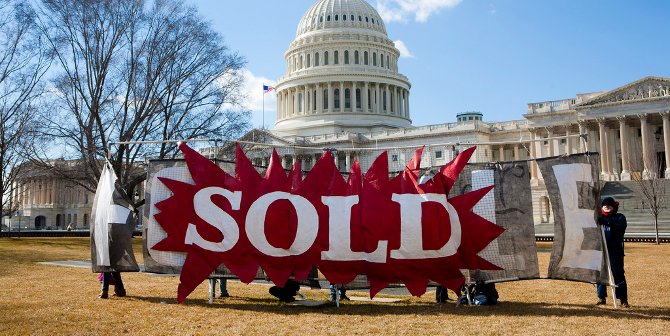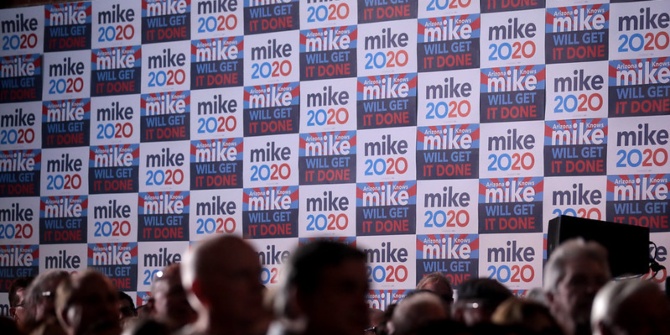 Earlier this month, the Chair of the Federal Election Commission, Ann M. Ravel described the organization as “worse than dysfunctional”. Melissa M. Smith looks at this dysfunction as the 2016 presidential campaign unfolds. She argues that the FEC has been largely powerless to enforce campaign finance law in the wake of 2010’s Citizens United decision, and the powerful Super PACs which have followed it. In some cases the FEC is facing a five-year backlog for investigating complaints, and its current enforcement actions are relatively weak. With reform of the FEC unlikely before the 2016 election, the next 18-months are likely to be a campaign finance free for all.
Earlier this month, the Chair of the Federal Election Commission, Ann M. Ravel described the organization as “worse than dysfunctional”. Melissa M. Smith looks at this dysfunction as the 2016 presidential campaign unfolds. She argues that the FEC has been largely powerless to enforce campaign finance law in the wake of 2010’s Citizens United decision, and the powerful Super PACs which have followed it. In some cases the FEC is facing a five-year backlog for investigating complaints, and its current enforcement actions are relatively weak. With reform of the FEC unlikely before the 2016 election, the next 18-months are likely to be a campaign finance free for all.
The current Federal Election Commission (FEC) chair wrote in a Washington Post article earlier this year that Americans want all political candidates to play by the rules, and that those who break the rules should be held accountable.
Really? If that’s true, the question becomes who will enforce those rules, given that the FEC seems incapable of governing itself, much less the upcoming 2016 elections. Ann M. Ravel, the FEC chair, has already admitted as much. In a recent interview with The New York Times, she described the commission as “worse than dysfunctional” and frankly stated that the commission is unlikely to punish candidates for breaking the rules in the upcoming elections.
Such an admission must be making campaign managers all over the country salivate in anticipation. It is widely expected that the 2016 election will break former fundraising records and push campaign spending toward the $10 billion mark. Large sums of money are already moving around to presidential candidates, some of whom haven’t even formally declared their candidacies, such as former Governor of Florida, Jeb Bush. If the FEC were not toothless and ineffective, those presumptive candidates would be facing punitive actions for raising money without declaring their intentions to run.
Much discussion about the FEC’s ineffectiveness has centered on its makeup — three Republicans and three Democrats. The gridlock within this commission often mimics that in Congress, where the ideological divide creates a similar dysfunction. But the ideological differences between the members of the FEC — some of whom seem to have a personal dislike for each other – highlight differences that go to the heart of the controversy surrounding campaign financing in the United States.
The FEC seemed much more inclined to levy fines before the U.S. Supreme Court’s Citizens United v. FEC ruling in 2010. Washington had dealt with campaign finance reform over the years, but this sweeping decision seemed to happen at a time in which the FEC was dealing with a large backlog of complaints and the ideological differences on the commission were already making enforcement difficult.

The Citizens United decision led, in part, to the development of Super Political Action Committees (PACs). Since the 2010 ruling, Super PACs have changed the way that U.S. federal campaigns are conducted. Super PACs must report donations and expenditures, and they are not allowed to coordinate with a candidate’s campaign (although some have allegedly flouted this rule). However, many of the Super PACs have sister organizations that operate with a non-profit status, which means that they can accept donations without disclosure and then funnel those funds to the Super PACs. This so-called “dark money” has become a major source of campaign funds and a way for individuals, corporations, or unions to give to candidates without potential backlash for the donations.
Since 2010, Super PACs have been gaining influence and pumping huge amounts of money into U.S. federal elections. In 2012, outside groups such as Super PACs raised more money than the political parties. In the 2014 midterm elections, there was yet another injection of Super PAC monies, with more than $348 million spent by over 1,300 active groups (OpenSecrets.org), or $40 million more than was spent in 2010.
Even though it has been five years since the Citizens United and SpeechNow.org v. FEC decisions (which combined to give birth to Super PACs) the FEC still has yet to write rules interpreting how these decisions should be implemented and regulated. Even without the new interpretations, those working to comply with the FEC and those within the FEC working to investigate cases must stagger under 229 pages of federal election laws and 550 pages of related regulations The commission is so far behind on cases that in March of this year, the members finally ruled on a 2010 case involving Sen. John McCain.
In January 2015, the FEC accused Crossroads GPS, a 501(c)(4) group associated with the American Crossroads Super PAC, of violating its social welfare status (which allows it to have a non-profit designation) by spending money to support conservative Republican candidates. But the commission took no action against the group, meaning that it can continue to withhold the identity of its donors. American Crossroads is one of the larger Super PACs, and one of its founders was Karl Rove. The commission merely slapped the hands of one of the largest groups handing out money to campaigns, sending a clear message that it is incapable of taking any action that might be seen as controversial or political.
So, the question becomes, is there a way to fix the FEC? The short answer is that it won’t happen before the 2016 elections. It may not be possible at all, given the circumstances.
The members of the commission are trying to come at campaign finance from opposing viewpoints. The Democrats on the commission are in favor of more transparency regarding financial donations and spending, while Republicans see such actions as a chilling of political speech. Democrats want to effect change, but the Republicans like things the way they are. This impasse will not be broken without a major change in either the makeup of the commissioners or a change in how it is administered. That will require Congressional action, and that seems unlikely given that the Republicans — who want less government regulation of campaigns — are in the majority in both the House and the Senate.
In the meantime, it’s a free-for-all for candidates and Super PACs. As the 2016 elections get closer, more candidates — and undeclared candidates — are auditioning for money from wealthy individuals and corporations, hoping that they will reel in the big donations, because money is the fuel that keeps campaigns moving. The already-crowded Republican field will probably get more crowded, and FEC rules will probably be disregarded by many campaigns on both sides of the aisle. After all, if it takes more than five years for a potential violation to be dealt with by the FEC, campaigns will be willing to fudge a bit on the no-coordination prohibition, neglect the reporting of some donations, and to procrastinate when faced with reporting deadlines.
Please read our comments policy before commenting.
Note: This article gives the views of the author, and not the position of USApp– American Politics and Policy, nor of the London School of Economics.
Shortened URL for this post: http://bit.ly/1Enh6bv
_________________________________
 Melissa M. Smith – Mississippi University for Women
Melissa M. Smith – Mississippi University for Women
Melissa M. Smith is an Assistant Professor in the Department of Communication at Mississippi University for Women. Her research focuses on U.S. elections, particularly campaign finance reform. Her work has appeared in several journals, and she is the co-author of two books, Campaign Finance Reform: The Political Shell Game, and Dark Money, Super PACs, and the 2012 Election, both published by Lexington Books.






